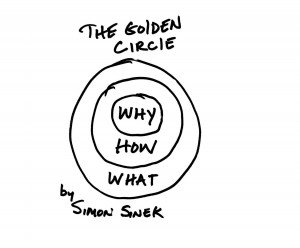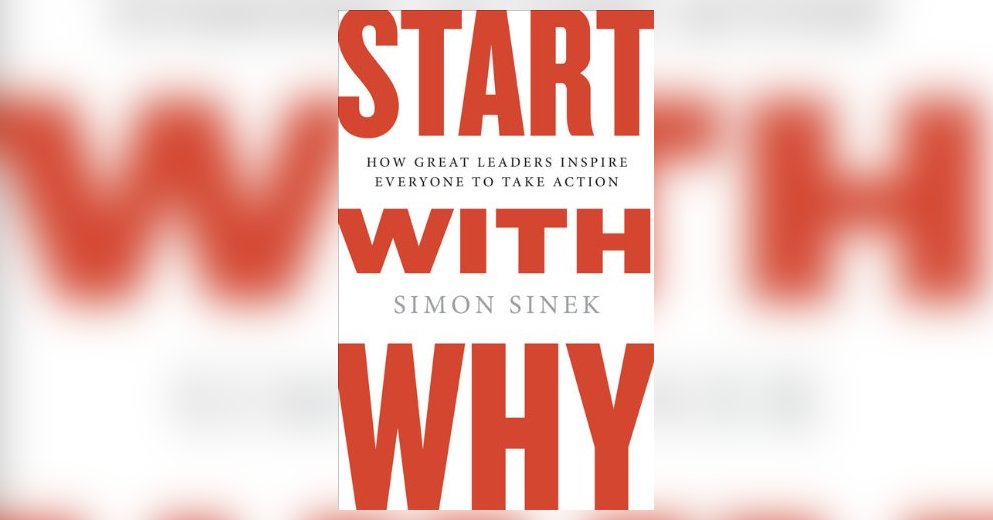Management, Business Development, Marketing, Leadership, and Living is best done with a purpose. Start With Why, by Simon Sinek, looks deeply at the power of purpose to motivate, inspire the self and others, and to produce great outcomes. Ostensibly about leadership, inspiring loyalty and devotion is something that also applies as a goal in modern marketing and in the quality of what you produce for your customers.
 Simon Sinek is famous for his Ted Talk, ‘How Great Leaders Inspire Action’, which is the 3rd most watched Ted Talk on Ted.com. In this book, the concept is taken further wit what he sees as something natural and part of human decision-making. The book seeks to explain what makes us inspired by some people, by some leaders, by some messages and organisations over others.
Simon Sinek is famous for his Ted Talk, ‘How Great Leaders Inspire Action’, which is the 3rd most watched Ted Talk on Ted.com. In this book, the concept is taken further wit what he sees as something natural and part of human decision-making. The book seeks to explain what makes us inspired by some people, by some leaders, by some messages and organisations over others.
The first interesting take-away for me, as it applies to marketing and business, is the difference between manipulation and inspiration. We are constantly bombarded with product signals from price, marketing signals of fear, peer pressure, and novelty. These manipulations often lead to transactions, however not very often to loyalty.
To really inspire loyalty, Sinek suggests that business leaders need to move from messages converting WHAT they produce, through HOW they produce, to the ideal starting point – WHY they do what they do. The obvious examples of Apple’s marketing and messaging strategy backs this up well. Their entire motivation is to change the world, which is why their innovations across a range of products leave their competitors with no option but to market on the basis of WHAT their product does different or better. Differentiation or incremental improvement does not inspire loyalty.
A strong WHY talks to our inner values and beliefs, which is far deeper and more compelling than our wallets. It accelerates trust, makes us feel secure in our decision making, and compels us to seek out the products that support these feelings. Products like these give us a way of communicating our values to the world. If an organisation can’t communicate their WHY or supply a product that speaks a value, then all that is left is the WHAT and the tools of manipulation.
Sinek points out that when manipulation thrives, as does uncertainty for buyers, instability for sellers, and stress for all. What stands out in such an environment is authenticity. Authenticity arises when you say and do what you believe, and this is powered by your purpose. Your WHY, and the WHY of your buyer, results in a market of one when they align. Only your product will allow your consumer to express their values through the product of your values. Authenticity occurs when your WHY is in balance with your WHAT and your HOW, uncertainty is smashed, instability is erased, and stress is replaced with comfort.
The book also looks at the nature of trust being seen to be driven by values, the influence of others that share our values and beliefs, and have our trust embedded in them, and how this leads to viral take up once the tipping point is exceeded.
The real meat of the book comes in Sinek’s description of how to apply the principles. Start with WHY, but know HOW, consolidates the ideal. The clarity of your WHY will dictate the WHAT and HOW to give your product or service life. The next step is to communicate it effectively to the marketplace. Sinek appears to rely on the strength of the WHY to create the loyalty and influence that eventually exceeds a tipping point that results in a bucketload of sales, however I can’t help but feel a little manipulation and investment is required. If Apple is the prime example of an organisation with a product range with a strong sense of why, their market share has certainly been enhanced by clever advertising, an enormous marketing spend, and clever channels.
Start With Why ends with a reminder that finding your WHY is not to look ahead, or a result of market research, but from looking in the opposite direction as a process of discovery rather than invention. Discovering and coveting your WHY is not the hard part but the discipline to trust it, to stay true, and remain in balance and authentic is the most difficult part.
“When you compete against everyone else, no one wants to help you. But when you compete against yourself, everyone wants to help you.” This is one of my favourite quotes and it appears in the last chapter of the book. It speaks of the need to constantly improve, to be better, to be smarter, for no other reason than to remain in balance with our WHY. Success isn’t about incremental improvements on competitors, no one cares if you are in a game of whack-a-mole watching your competitors and picking off their techniques and methods. They care, and will reward you, when they can see your WHY and see your commitment to it in all your processes and practices, and see you consistently work to do more to improve your products and services.




